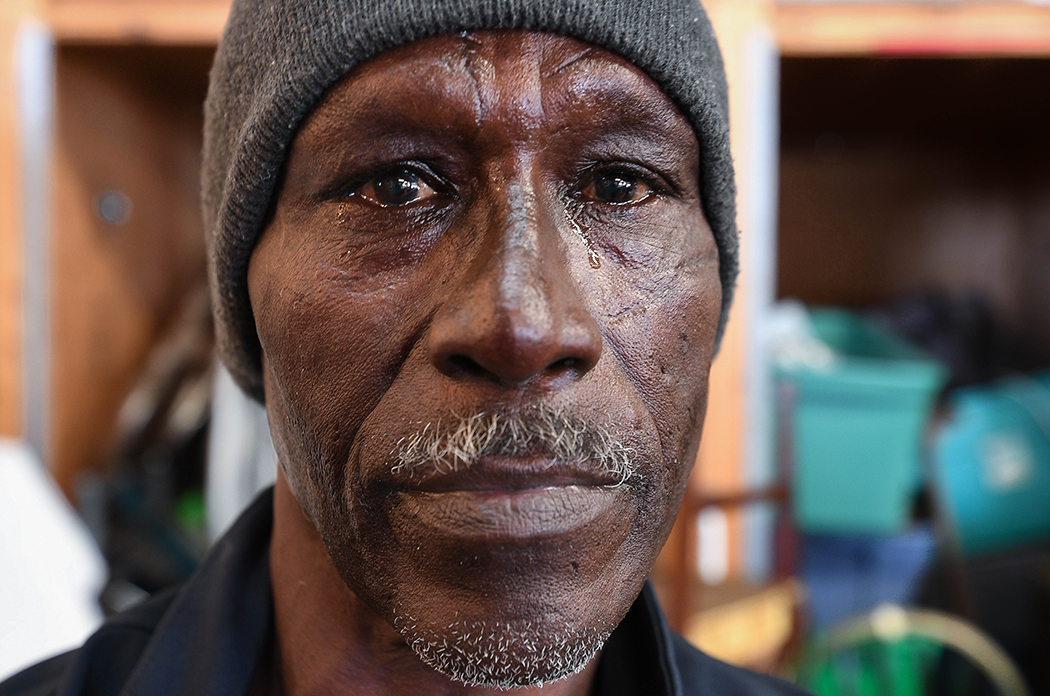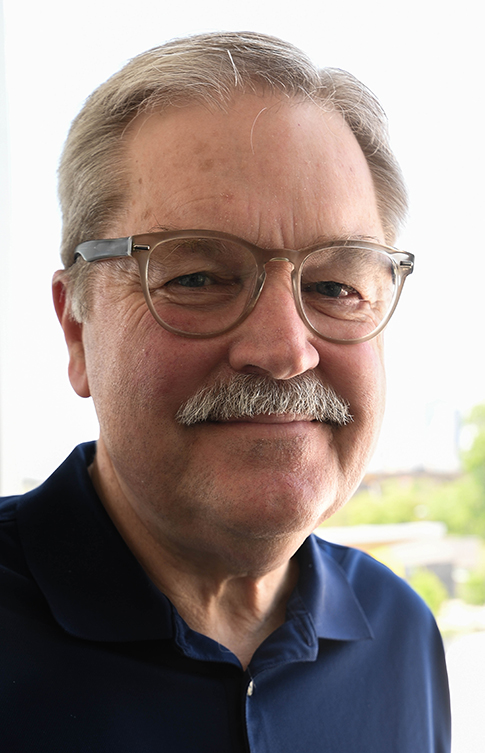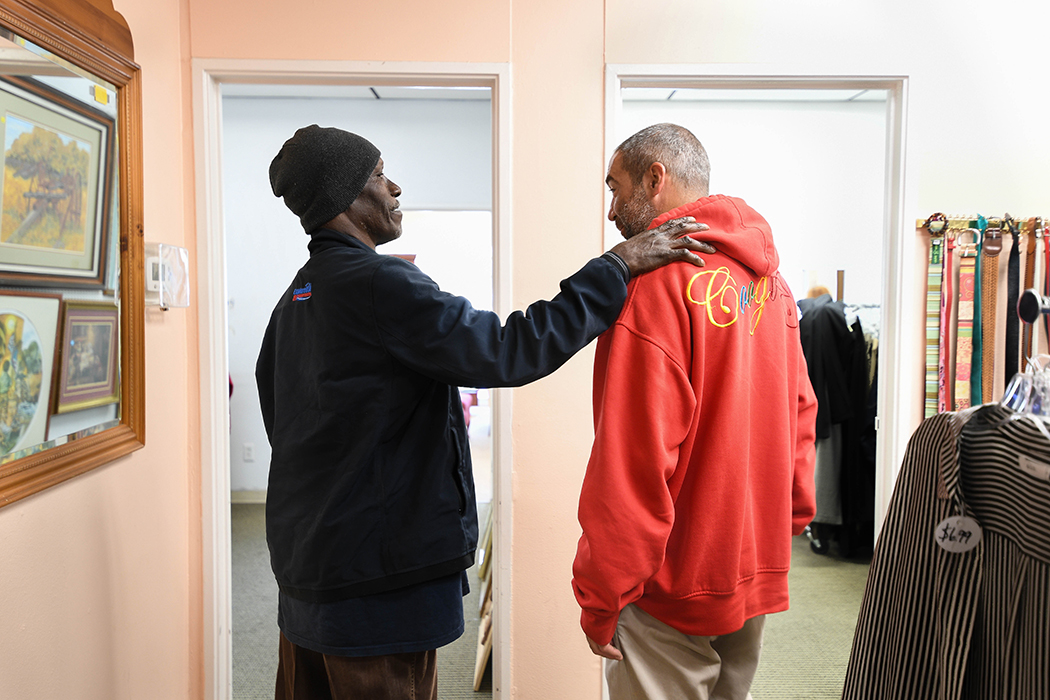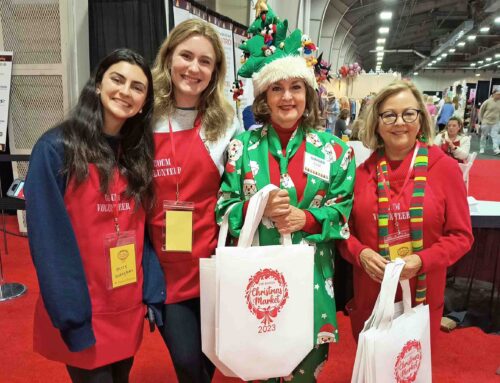
Carl Oatman found a home and a purpose with CitySquare. (Photo by Hannah Ridings)
Thrift store volunteer Carl Oatman and CitySquare CEO Larry James might not appear to have much in common, but they are both part of a poverty fighting organization that turns traditional methods on their heads.
Oatman never wanted to be a burden, but he felt like one to his alcoholic parents and older sister, who played mother to the other four siblings in their cramped Seagoville home. They lived in the country, and he enjoyed spending time outside, away from all the social entanglements that made living at home difficult.
He left home at 17, didn’t tell his family and set out for Dallas to find a job. He worked at a factory on HVAC units in Mesquite and was named foreman after a few years. But when the factory closed, he had trouble getting another job and ended up living on the streets.
He didn’t tell his family about his troubles, and eventually he lost touch with them. Their lives were hard too. Oatman learned just how tough while reading the newspaper one day. He was horrified to learn that his brother, who was trying to steal from his mother to fund his drug habit, killed her after stabbing her 13 times.
At that point, Oatman says he gave up. He continued to experience homelessness and was arrested for public intoxication several times. Oatman lived on the street for nearly a decade, bouncing from bridge to bridge, unable to find steady work or housing.
Oatman didn’t like being cooped up in a building with too many people, and he resisted some of the group housing that was available.“I slept outside in the rain, sleet and snow,” he says.
But one night, a friend told him about CitySquare. What would eventually become his home was under construction at the time. He went to check it out. He saw a community of small single-family houses, close to the CitySquare Opportunity Center, which provided concierge medical and other services to reach the people living at The Cottages at Hickory Crossing.
“I was happy. It’s something you can say is yours,” he says. “The decisions are up to you.”

Larry James CEO CitySquare Opportunity Center. (Photo by Hannah Ridings)
If that is where the story ended, it would be a heart-warming tale of a charity providing a need. But at CitySquare, the relationship between individual and organization is reciprocal. Its model for fighting poverty involves asking what those who receive services can give to the organization. “We are inviting everybody that comes for help to understand that we need help too,” says James, CitySquare CEO and Munger Place neighbor.
City Square began as a food pantry, but over the years it became a poverty-fighting nonprofit with programs that provide housing, job training, food, legal help and arts. Its success is contingent on the community serving the organization and teaching community members how to best address poverty.
James remembers asking a woman who was a customer at the food pantry to help him translate for another group. She did the interview herself, and James asked her to come back the next day. “She came back tomorrow, and almost every tomorrow for nine years,” he says.
Including customers in guiding the nonprofit revolutionized the way he thought about addressing poverty, and the concept became core to CitySquare’s mission. It asks those who are in a position to help to see the poor as an asset, not a burden. “People closest to a problem know the most about it,” James says.
James is a pastor by trade. He led several Church of Christ congregations before his time at CitySquare. Faith guides him to action on both a personal and systematic level. For James, it is about an attitude change, not just a willingness to give. “To change poverty in America, we are going to have to change our attitude towards people who experience the problem,” he says. “Faith doesn’t mean much if it doesn’t make the world better.”
Oatman gives back by working in CitySquare’s Urban Thrift store in Old East Dallas. He volunteers a few days a week, but he often comes on his off days to offer more help. In return for his service, he gets meal vouchers and bus passes. “If you are willing to help yourself, they are willing to help you,” he says.
He helps inventory donated items, organize the store and work the loading dock. He says he finds meaning and purpose in his responsibilities. “Even if you don’t have anything, you are helping somebody,” Oatman says. “And it feels great.”
It takes 40 volunteers a day to help CitySquare fight poverty in Dallas, and the nonprofit offers a variety of positions. Learn more at citysquare.org.

Carl Oatman at work in Urban Thrift. (Photo by Hannah Ridings)
CitySquare
by the numbers (2017):
40,000
neighbors served
391
family law cases, resulting in $1,105,831 in child support for 422 children
135,937
hours of service via AmeriCorps
2,099,739
pounds of food distributed to 13,805 individuals
1,295
neighbors served by the community clinic
615
housed through housing programs
141
jobs obtained





